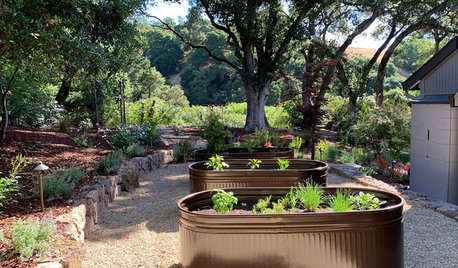Is organic produce is starting to increase in demand?
mike758
10 years ago
Related Stories

MOST POPULAR10 Things to Ask Your Contractor Before You Start Your Project
Ask these questions before signing with a contractor for better communication and fewer surprises along the way
Full Story
ARCHITECTUREDesign Practice: How to Start Your Architecture Business
Pro to pro: Get your architecture or design practice out of your daydreams and into reality with these initial moves
Full Story
REMODELING GUIDESWhat to Consider Before Starting Construction
Reduce building hassles by learning how to vet general contractors and compare bids
Full Story
FARM YOUR YARD6 Things to Know Before You Start Growing Your Own Food
It takes time and practice, but growing edibles in the suburbs or city is possible with smart prep and patience
Full Story
CONTRACTOR TIPS10 Things to Discuss With Your Contractor Before Work Starts
Have a meeting a week before hammers and shovels fly to make sure everyone’s on the same page
Full Story
HOUSEPLANTSHow to Grow Orchids Indoors
Orchids are the exotic aristocrats of the flower world and can make themselves comfortable in almost any home
Full Story
GARDENING GUIDESGet a Head Start on Planning Your Garden Even if It’s Snowing
Reviewing what you grew last year now will pay off when it’s time to head outside
Full Story
KITCHEN DESIGNStylish New Kitchen, Shoestring Budget: See the Process Start to Finish
For less than $13,000 total — and in 34 days — a hardworking family builds a kitchen to be proud of
Full Story
LANDSCAPE DESIGNLearn Your Garden’s Microclimates for a Resilient Landscape
Reduce your water demand and learn the basis of planting the right plant in the right place
Full Story
ORGANIZINGYour Total Home Organizing and Decluttering Guide
Take it slow or be a speed demon — this room-by-room approach to organizing and storage will get your home in shape no matter how you roll
Full StoryMore Discussions








mike758Original Author
Natures_Nature
Related Professionals
Horsham Landscape Architects & Landscape Designers · Oconomowoc Landscape Architects & Landscape Designers · Bergenfield Landscape Contractors · Columbine Landscape Contractors · Matteson Landscape Contractors · Midland Landscape Contractors · Newnan Landscape Contractors · Paramus Landscape Contractors · Siloam Springs Landscape Contractors · Tacoma Landscape Contractors · Vallejo Landscape Contractors · Palos Heights Landscape Contractors · Clute Decks, Patios & Outdoor Enclosures · Marlboro Decks, Patios & Outdoor Enclosures · Somerville Decks, Patios & Outdoor Enclosuresnc_crn
TheMasterGardener1
mike758Original Author
TheMasterGardener1
mike758Original Author
Natures_Nature
Natures_Nature
mike758Original Author
Natures_Nature
Natures_Nature
TheMasterGardener1
Natures_Nature
TheMasterGardener1
mike758Original Author
Natures_Nature
TheMasterGardener1
Kimmsr
Natures_Nature
nc_crn
Natures_Nature
nc_crn
Natures_Nature
TheMasterGardener1
Natures_Nature
Natures_Nature
TheMasterGardener1
Natures_Nature
TheMasterGardener1
mike758Original Author
TheMasterGardener1
Lloyd
GreeneGarden
mike758Original Author
mike758Original Author
TheMasterGardener1
dirtguy50 SW MO z6a
nc_crn
mike758Original Author
dirtguy50 SW MO z6a
dirtguy50 SW MO z6a
nc_crn
elisa_z5
mike758Original Author
wayne_5 zone 6a Central Indiana
mike758Original Author
Lloyd
wayne_5 zone 6a Central Indiana
marshallz10